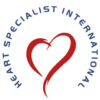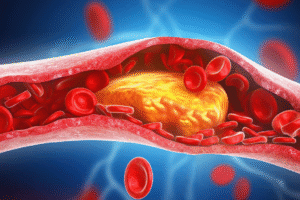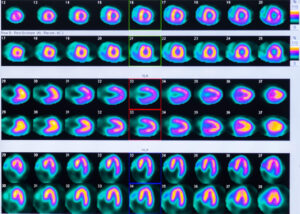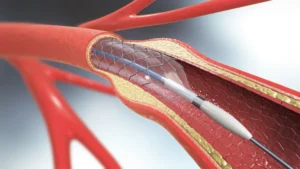If you’ve been advised to take a stress echocardiogram, you might be wondering what it actually reveals, especially when it comes to detecting blocked arteries. This test is often used when someone experiences symptoms like chest pain or breathlessness, and the doctor wants to find out how well the heart copes under stress.
This is a non-invasive test, does not involve injection and no X-ray/radiation is involved.
Let’s explore how a stress echocardiogram works, what it shows, and how it plays a role in diagnosing coronary artery disease (CAD), a condition where narrowed or blocked arteries reduce blood flow to the heart muscle.
What Is a Stress Echocardiogram?
A stress echocardiogram combines two types of heart tests:
- A treadmill or stationary bike test that raises your heart rate (known as an exercise stress test).
- An echocardiogram (ultrasound) that captures images of your heart before and after the physical activity.
If you’re unable to exercise, you might receive medication that mimics the effect of physical activity by making your heart work harder.
The goal is to see how your heart functions when it’s working under pressure. Images taken before and after exercise are compared to assess how well different parts of your heart muscle are moving and whether any areas are struggling to get enough blood.
How Can It Help Detect Blocked Arteries?
Your heart needs more oxygen-rich blood during exertion. If one or more coronary arteries are narrowed or blocked, blood flow may not increase as it should, and parts of the heart muscle may not contract as well during exercise.
The stress echocardiogram helps to:
- Identify reduced blood flow – If part of the heart isn’t pumping normally during exercise, it may be due to a blocked or narrowed artery.
- Spot early signs of coronary artery disease – Changes in heart wall motion under stress can signal an issue before symptoms become more serious.
- Guide further testing or treatment – If the test suggests there may be a blockage, your cardiologist may recommend additional imaging or procedures.
In this way, the test helps doctors decide whether you need treatment such as lifestyle changes, medications, or procedures like coronary angiography or angioplasty.
What Are the Signs That a Stress Echo Might Be Needed?
A stress echocardiogram may be recommended if you’re experiencing symptoms like:
- Chest discomfort (especially during activity)
- Shortness of breath
- Fatigue that seems unusual during exercise
- Irregular heart rhythms
- Screening for heart disease
It may also be used for people with known risk factors such as high blood pressure, diabetes, or a family history of heart disease.
How Does It Compare to Other Heart Tests?
While a regular echocardiogram looks at heart function at rest, a stress echo goes a step further by showing how your heart performs when it’s under strain.
It differs from:
- ECG (electrocardiogram) – which measures electrical signals but doesn’t show detailed images of heart structure.
- Treadmill stress test (without echo) – which shows how your heart rate and rhythm respond to exercise, but doesn’t give visual detail on how well the heart muscle is working.
By combining imaging with exercise, a stress echocardiogram greatly improves the accuracy over and above treadmill ECG. It gives a more complete picture of how well blood is flowing to your heart muscle.
When It’s Useful and When It Might Not Be Enough?
A stress echocardiogram is a useful first step in evaluating chest pain and possible heart disease. However, it might not detect very small blockages or issues in smaller arteries.
If results are unclear or if symptoms persist despite a normal test, your cardiologist might recommend other imaging tests, such as a CT coronary angiogram or an invasive coronary angiography, to get a closer look at the blood vessels.
What Should You Do Next?
If you’ve been experiencing symptoms or have risk factors for heart disease, it’s worth having a conversation with your doctor. A stress echocardiogram is one of several tools that can help paint a clearer picture of your heart health.
At Heart Specialist International, Dr Paul Ong can guide you through the process of evaluating your heart function and deciding whether a stress echocardiogram, or another test, is right for you.
Book a consultation with Dr Paul Ong today to discuss your symptoms and start looking after your heart. Early action makes a big difference when it comes to preventing serious heart conditions.












